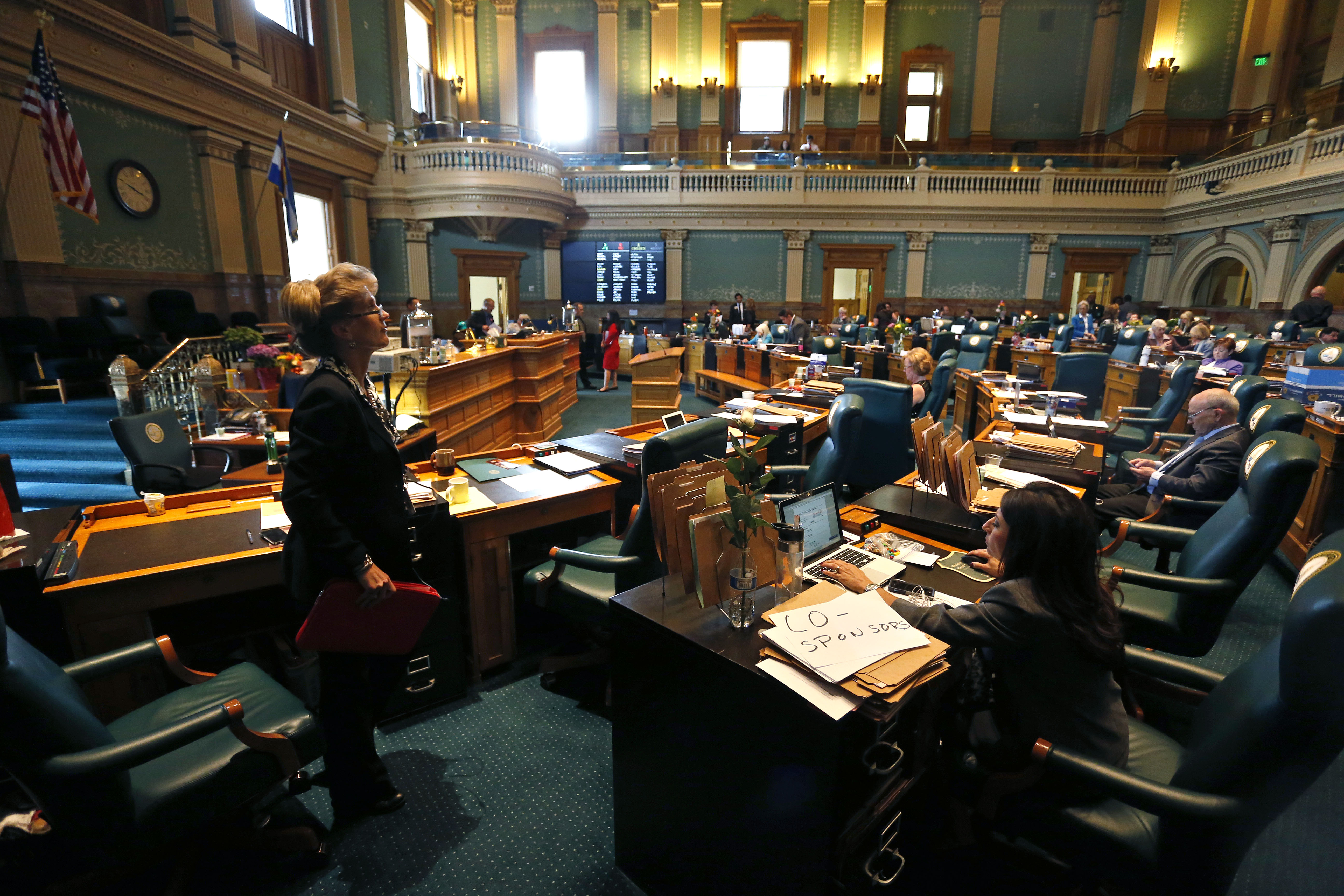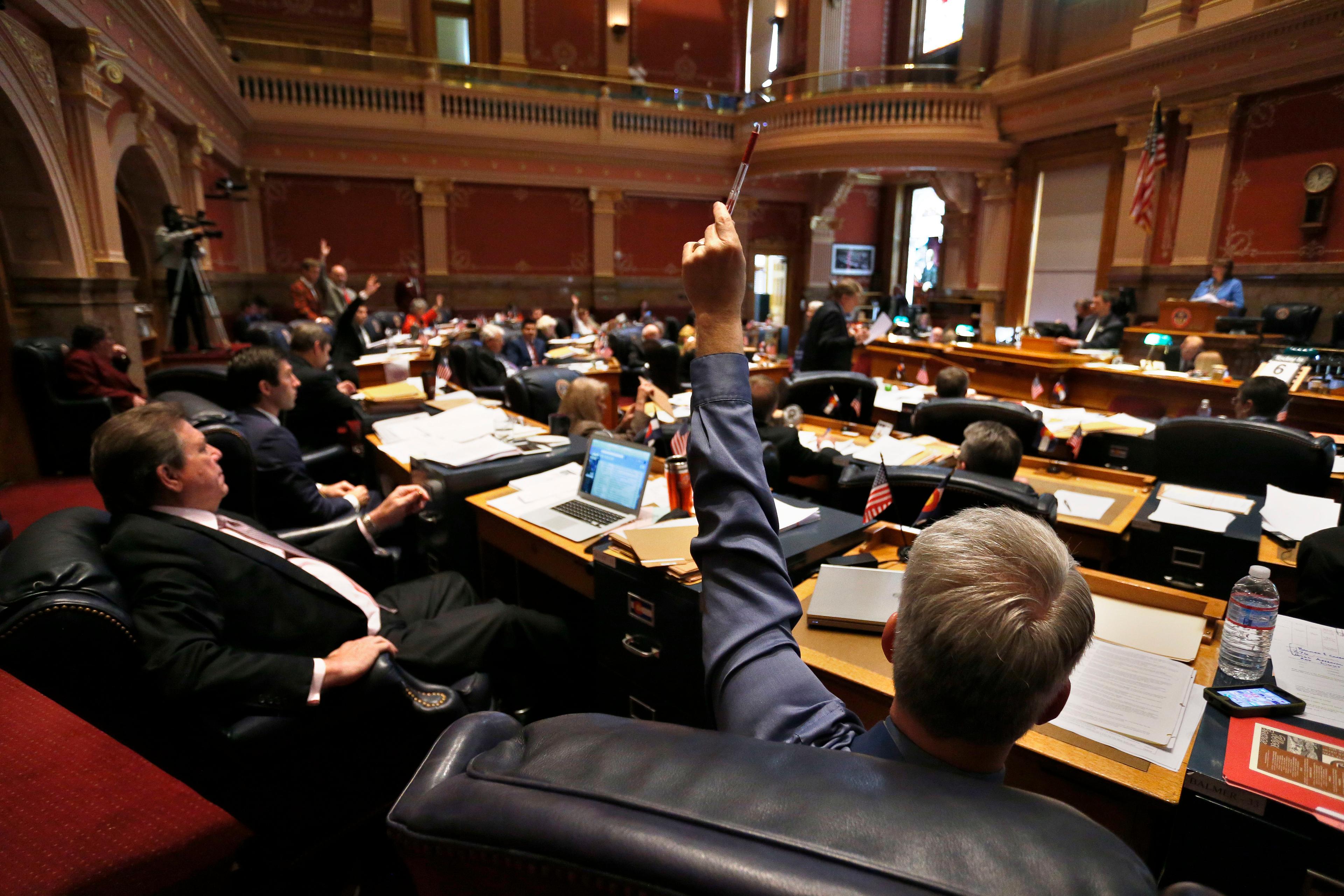
CPR News reporters Jenny Brundin, John Daley, Grace Hood and Megan Verlee talk with Colorado Matters host Ryan Warner at 10 a.m. Monday about some of the highlights from the 2015 legislative session. Here's some of what they followed:
1. Bill Clinton was president the last time elected officials got a raise
Verlee: A salary increase looks like it's in sight for the folks serving at the pleasure of the voters. In the final days of the session, lawmakers passed a bill to increase the salaries of state and county elected officials, starting in 2019. The salary increase is expected to cost Colorado $1.3 million a year.
In arguing for the measure, Rep. Bob Rankin, R-Carbondale, noted that Colorado’s statewide officials currently earn some of the lowest salaries in the country. Pay for Colorado’s governor ranks 47th out of the 50 states. The Attorney General is 49th. And of the 46 states that have a Secretary of State, Colorado comes in 45th.
The salaries for those three offices will rise around 60 percent. Legislative staff estimates the change will result in a 25 percent raise for state lawmakers, to $41,828 a year. County elected officials, including commissioners and sheriffs, are also likely to see their salaries increase significantly.

2. A successful teen contraception program won't get state funds
Verlee: One of Gov. John Hickenlooper’s goals that went unmet this session was to dedicate $5 million to continue the Colorado Family Planning Initiative, which stated five years ago via a $25 million private grant. The program supplies free long-acting contraction – IUDs and under-the-skin implants – to the state’s family planning clinics and trains staff to administer them.
The state credits the effort with contributing to a steep decline in teen pregnancy and abortion rates in recent years -- 40 percent between 2009 and 2013, compared to the national the teen birth rate, which dropped 29 percent from 2007 to 2012.
Most of the legislature’s Republicans opposed the idea of the state picking up the tab for the effort. For many, the concern had to do with the morality of the state providing free contraception, especially to teens. Others argued the program is unnecessary because both Medicaid and private insurance are supposed to cover these forms of contraception. (Teens using the family planning program may not consider acquiring the devices through their parents’ health insurance a viable option.)
Without new funding, the program’s money will run out this summer. However, the state's health director Larry Wolk told told Colorado Health News he’s not ready to let the effort end, and he wants to see if money can be raised through private foundations.
3. Construction defects bills die
Verlee: With rents and home prices both sky-high, there’s a lot of construction going on in the Denver metro area and along the rest of the northern Front Range. But when it comes to multi-family projects, the vast majority of those new buildings are apartments, not condominiums.
Why is that a big deal? Because, many policymakers and analysts will tell you, the lack of condo construction may be leaving first time homebuyers with few affordable options. They blame Colorado’s ‘construction defects’ laws with driving lawsuit-wary builders out of the market.
To address that concern, lawmakers introduced two bills this past session aimed at making it harder for unit owners to sue. The primary measure would have required at least half of all owners in a building sign on before a complaint could move forward, and the first step would have to be arbitration or mediation, before the matter could go to court. The second bill would have reduced the period of time for unit owners to bring a defect claim after the end of construction.
The House’s Democratic leadership firmly opposed both measures, arguing they would make it harder to hold builders responsible for shoddy construction. Both measures died in House committees.

4. A groundbreaking marijuana bill passes
Daley: The bill would allow kids with conditions like cerebral palsy, seizures or epilepsy to take low-dose medical marijuana at school. Pot is legal in Colorado, but schools remain drug-free zones. Opponents argued they should stay that way. But backers said medical marijuana should be treated like any other medications.
The bill's passage was, in part, inspired by the story of a 14-year-old boy from Jefferson County with cerebral palsy. His school wouldn't allow him to use cannabis oil and a patch. This bill would allow, with a doctor's note, parents, and caregivers, to administer marijuana at school, for instance via a transdermal patch.
The governor is expected to sign the bill. If he does, the According to National Conference of State Legislatures in Denver says Colorado would become the first state to enable a school district to adopt such a policy.
5. The health insurance exchange is still a big story
Daley: Lawmakers approved an in-depth audit of Connect for Health Colorado. Its timing and scope will become more clear by the end of the summer. The exchange has a new interim CEO, Kevin Patterson. He served the Hickenlooper administration in several posts and is a former exchange board member.
His arrival comes as a legislative oversight committee is ramping up. It's led by Republican Senator Ellen Roberts from Durango. She's said she wants to seek "the unvarnished truth," about the exchange. The committee is planning 10 meetings now that the session is over.
6. Public K-12 funding got a $306M boost, but there's still a shortfall
Brundin: In this year’s school finance bill, lawmakers increased K-12 funding by $306 million to $6.23 billion next school year to cover enrollment and inflation. That’s only $25 million in extra cash to plug the $880 million shortfall stemming from the deep cuts of the recession.
Schools will get about $7200 dollars per student, still well below the national average. But it is a bump of $270 dollars per student over last year.
School superintendents had wanted an extra $70 million this year for small rural districts and districts with high numbers of students living in poverty. At the last minute, lawmakers did find $10 million for rural districts with fewer than 1,000 students.
 7. Standardized school testing was scaled back
7. Standardized school testing was scaled back
Brundin: Lawmakers cut time students spend doing state testing from Kindergarten through 12th grades from an estimated 137 hours to 102, and eliminates state testing in 11th and 12th grades altogether. There will be state tests in 9th grade and students will take a much shorter 10th grade test -- the ACT Aspire pending federal approval. Not much changes for students in grades 3 through 8 because federal law requires them to be tested every year.
Literacy tests are streamlined for students in K through 3rd grades. And a compromise was struck on social studies tests. Instead of being given to every student once in elementary, once in middle and once in high school -- tests will only be given in a sample of schools.
The bill also lets schools give state tests with paper and pencil instead of on computers. It also clarifies that students won’t be punished if they opt out, though teachers and schools will still face penalties if students opt out.
8. No agreement on the Clean Power Plan
Hood: This legislation sparked a lot of debate, but ultimately failed. It had to do with the centerpiece of the Obama Administration’s climate change agenda: The Clean Power Plan.
In an effort to reduce carbon emissions at power plants, the federal government is asking states to draft plans determining how they want to reduce carbon emissions. Colorado Republicans wanted the state’s public utilities commission and the General Assembly to have a say in the plan. Colorado Democrats argued that the bill was a veiled effort to protect the fossil fuel industry from more stringent regulations. The Plan is expected to be finalized later this summer.
9. More oil field health monitors and inspectors
Hood: In 2015, the state legislature approved funding for two oil and gas task force proposals. The Colorado Department of Public Health and Environment will receive more than $2 million for more staff to monitor air quality around well pads and set up a hotline to field questions from the public on industry-related health concerns. The agency will also launch a supporting web site. Meantime, the Colorado Oil and Gas Conversation Commission is getting $1.4 million to beef up its inspection staff.
10. Republicans failed to rollback of statewide renewable energy
Hood: The GOP wanted to cut required renewable use in half, from 30 percent to 15 percent by 2020. And there were separate proposed reductions for rural electric coops. Republicans in control of the state senate approved it, but it failed to pass through the Democratic-controlled House.
11. And rain barrel water collection is still illegal
Hood: It came down to the wire, but legislation promoting the use of residential barrels to collect rainwater failed. Opponents argued that the barrels would impact downstream users negatively taking away water they’re entitled to. Proponents said the impact wasn’t a real concern.
Correction: an earlier version of this article stated that one of the construction defects bills would have lowered the statute of limitations for legal action from 8 years to 6. The actual formula in the bill was more complicated.








